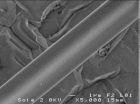(Press-News.org) Coral specialist Dr. Bert W. Hoeksema of Naturalis Biodiversity Center in Leiden, The Netherlands, recently published the description of a new coral species that lives on the ceilings of caves in Indo-Pacific coral reefs. It differs from its closest relatives by its small polyp size and by the absence of symbiotic algae, so-called zooxanthellae. Its distribution range overlaps with the Coral Triangle, an area that is famous for its high marine species richness. Marine zoologists of Naturalis visit this area frequently to explore its marine biodiversity.
Reef corals in shallow tropical seas normally need the symbiotic algae for their survival and growth. Without these algae, many coral reefs would not exist. During periods of elevated seawater temperature, most reef corals lose their algae, which is visible as a dramatic whitening of the reefs, a coral disease known as bleaching.
Most reef corals generally do not occur over 40 m depth, a twilight zone where sunlight is not bright anymore, but some species of the genus Leptoseris are exceptional and may even occur much deeper. At greater depths, seawater is generally colder and corals here may be less susceptible to bleaching than those at shallower depths. Despite the lack of zooxanthellae and its small size, the skeleton structures of the new species indicate that it is closely related to these Leptoseris corals, although it has not been found deeper than 35 m so far.
The species is named Leptoseris troglodyta. The word troglodyta is derived from ancient Greek and means "one who dwells in holes", a cave dweller. The discovery sheds new light on the relation of reef corals with symbiotic algae. The new species has adapted to a life without them. Consequently, it may not grow fast, which would be convenient because space is limited on cave ceilings. The species description is published in the open access journal ZooKeys.
INFORMATION:
Original source
Hoeksema BW (2012) Forever in the dark: the cave-dwelling azooxanthellate reef coral Leptoseris troglodyta sp. n. (Scleractinia, Agariciidae). ZooKeys 228: 21. doi: 10.3897/zookeys.228.3798
About ZooKeys
ZooKeys is a peer-reviewed, open-access journal launched to support free exchange of ideas and information in biodiversity science, issued by Pensoft Publishers. All papers published in ZooKeys can be freely copied, downloaded, printed and distributed at no charge for the reader. ZooKeys implemented several cutting-edge innovation in publishing and dissemination of science information and is considered a technological leader in its field.
Posted by Pensoft Publishers.
A new cave-dwelling reef coral discovered in the Indo-Pacific
Coral named Leptoseris troglodyta sheds light on coral-algal symbiosis
2012-10-11
ELSE PRESS RELEASES FROM THIS DATE:
How food marketers can help consumers eat better while improving their bottom line
2012-10-11
Food marketers are masters at getting people to crave and consume the foods that they promote. In this study authors Dr. Brian Wansink, co-director of the Cornell University Center for Behavioral Economics in Child Nutrition and Professor of Marketing and Dr. Pierre Chandon, professor of Marketing at the leading French graduate school of business, INSEAD challenge popular assumptions that link food marketing and obesity. Their findings presented last weekend at the Association for Consumer Research Conference in Vancouver, Canada point to ways in which smart food marketers ...
Research gives new insight into celiac disease
2012-10-11
For the first time, scientists have visualised an interaction between gluten and T-cells of the immune system, providing insight into how coeliac disease, which affects approximately 1 in 133 people, is triggered.
Published today in Immunity, the discovery was led by Dr Hugh Reid and Professor Jamie Rossjohn of Monash University, Professor Frits Koning of the University of Leiden and Dr Bob Anderson of biotechnology company ImmusanT Inc, based in the US.
An increasingly diagnosed chronic inflammatory disorder, coeliac disease affects the digestive process of the small ...
All healthcare professionals need training to deal with the sexual needs of patients
2012-10-11
Providing healthcare staff with a one-day training course on dealing with the sexual needs of people with an acquired physical disability gave them greater understanding of the issues patients faced and enabled them to address intimate questions more comfortably and proactively.
The findings were so encouraging that the authors of the study, published in the November issue of the Journal of Advanced Nursing, are calling for all healthcare practitioners to receive sexuality training, regardless of their role or the area of healthcare they work in.
Researchers surveyed ...
Queen's develops new environmentally friendly MOF production method
2012-10-11
Chemists at Queen's University Belfast have devised a novel, environmentally friendly technique, which allows the rapid production of Metal-Organic Frameworks porous materials (MOFs).
These revolutionary nanomaterials have the potential to transform hazardous gas storage, natural gas vehicles and drug delivery and have the highest surface-area of any known substance.
A sugar-lump sized piece of MOF material can have the same surface area as a football pitch.
Until now MOF manufacturing techniques have been limited as they are costly, slow and require large quantities ...
Research findings in solar cells will have an impact on solar panel industry
2012-10-11
University of Luxembourg's Laboratory for Photovoltaics has established a method to observe and prevent solar cell degradation before solar cell production is finished, which has implications for the solar cell manufacturing industry since chemical damage to solar cells can occur quickly.
Solar panels are capable of converting light energy from the sun into electrical energy because they contain solar cells – the "power generators" responsible for the energy in solar panels. Thin film solar cells have a coating that is responsible for absorbing the sun's energy, but ...
DNA confirms genetically distinct lion population for Ethiopia
2012-10-11
A team of international researchers has provided the first comprehensive DNA evidence that the Addis Ababa lion in Ethiopia is genetically unique and is urging immediate conservation action to preserve this vulnerable lion population.
While it has long been noted that some lions in Ethiopia have a large, dark mane, extending from the head, neck and chest to the belly, as well as being smaller and more compact than other lions, it was not known until now if these lions represent a genetically distinct population.
The team of researchers, led by the University of York, ...
A gene implicated in schizophrenia risk is also associated with risk for cannabis dependence
2012-10-11
Philadelphia, PA, October 11, 2012 – A paper by Shizhong Han and colleagues in the current issue of Biological Psychiatry implicates a new gene in the risk for cannabis dependence. This gene, NRG1, codes for the ErbB4 receptor, a protein implicated in synaptic development and function.
The researchers set out to investigate susceptibility genes for cannabis dependence, as research has already shown that it has a strong genetic component.
To do this, they employed a multi-stage design using genetic data from African American and European American families. In the first ...
Researchers create 'nanoflowers' for energy storage, solar cells
2012-10-11
Researchers from North Carolina State University have created flower-like structures out of germanium sulfide (GeS) – a semiconductor material – that have extremely thin petals with an enormous surface area. The GeS flower holds promise for next-generation energy storage devices and solar cells.
"Creating these GeS nanoflowers is exciting because it gives us a huge surface area in a small amount of space," says Dr. Linyou Cao, an assistant professor of materials science and engineering at NC State and co-author of a paper on the research. "This could significantly increase ...
Eco-friendly optics: Spider silk's talents harnessed for use in biosensors, lasers, microchips
2012-10-11
WASHINGTON, Oct. 11—Spiders use their silk to catch lunch. Now physicists are using it to catch light. New research shows that natural silk could be an eco-friendly alternative to more traditional ways of manipulating light, such as through glass or plastic fiber optic cables. Two teams independently exploring possible applications for the material's photonic talents will present their latest breakthroughs at the Optical Society's (OSA) Annual Meeting, Frontiers in Optics (FiO) 2012, to be held next week in Rochester, N.Y.
Biomedical engineer Fiorenzo Omenetto of Tufts ...
Airborne superbugs elude hospital cleaning regimes
2012-10-11
Hospital superbugs can float on air currents and contaminate surfaces far from infected patients' beds, according to University of Leeds researchers.
The results of the study, which was funded by the Engineering and Physical Sciences Research Council (EPSRC), may explain why, despite strict cleaning regimes and hygiene controls, some hospitals still struggle to prevent bacteria moving from patient to patient.
It is already recognised that hospital superbugs, such as MRSA and C-difficile, can be spread through contact. Patients, visitors or even hospital staff can inadvertently ...
LAST 30 PRESS RELEASES:
$3 million NIH grant funds national study of Medicare Advantage’s benefit expansion into social supports
Amplified Sciences achieves CAP accreditation for cutting-edge diagnostic lab
Fred Hutch announces 12 recipients of the annual Harold M. Weintraub Graduate Student Award
Native forest litter helps rebuild soil life in post-mining landscapes
Mountain soils in arid regions may emit more greenhouse gas as climate shifts, new study finds
Pairing biochar with other soil amendments could unlock stronger gains in soil health
Why do we get a skip in our step when we’re happy? Thank dopamine
UC Irvine scientists uncover cellular mechanism behind muscle repair
Platform to map living brain noninvasively takes next big step
Stress-testing the Cascadia Subduction Zone reveals variability that could impact how earthquakes spread
We may be underestimating the true carbon cost of northern wildfires
Blood test predicts which bladder cancer patients may safely skip surgery
Kennesaw State's Vijay Anand honored as National Academy of Inventors Senior Member
Recovery from whaling reveals the role of age in Humpback reproduction
Can the canny tick help prevent disease like MS and cancer?
Newcomer children show lower rates of emergency department use for non‑urgent conditions, study finds
Cognitive and neuropsychiatric function in former American football players
From trash to climate tech: rubber gloves find new life as carbon capturers materials
A step towards needed treatments for hantaviruses in new molecular map
Boys are more motivated, while girls are more compassionate?
Study identifies opposing roles for IL6 and IL6R in long-term mortality
AI accurately spots medical disorder from privacy-conscious hand images
Transient Pauli blocking for broadband ultrafast optical switching
Political polarization can spur CO2 emissions, stymie climate action
Researchers develop new strategy for improving inverted perovskite solar cells
Yes! The role of YAP and CTGF as potential therapeutic targets for preventing severe liver disease
Pancreatic cancer may begin hiding from the immune system earlier than we thought
Robotic wing inspired by nature delivers leap in underwater stability
A clinical reveals that aniridia causes a progressive loss of corneal sensitivity
Fossil amber reveals the secret lives of Cretaceous ants
[Press-News.org] A new cave-dwelling reef coral discovered in the Indo-PacificCoral named Leptoseris troglodyta sheds light on coral-algal symbiosis



